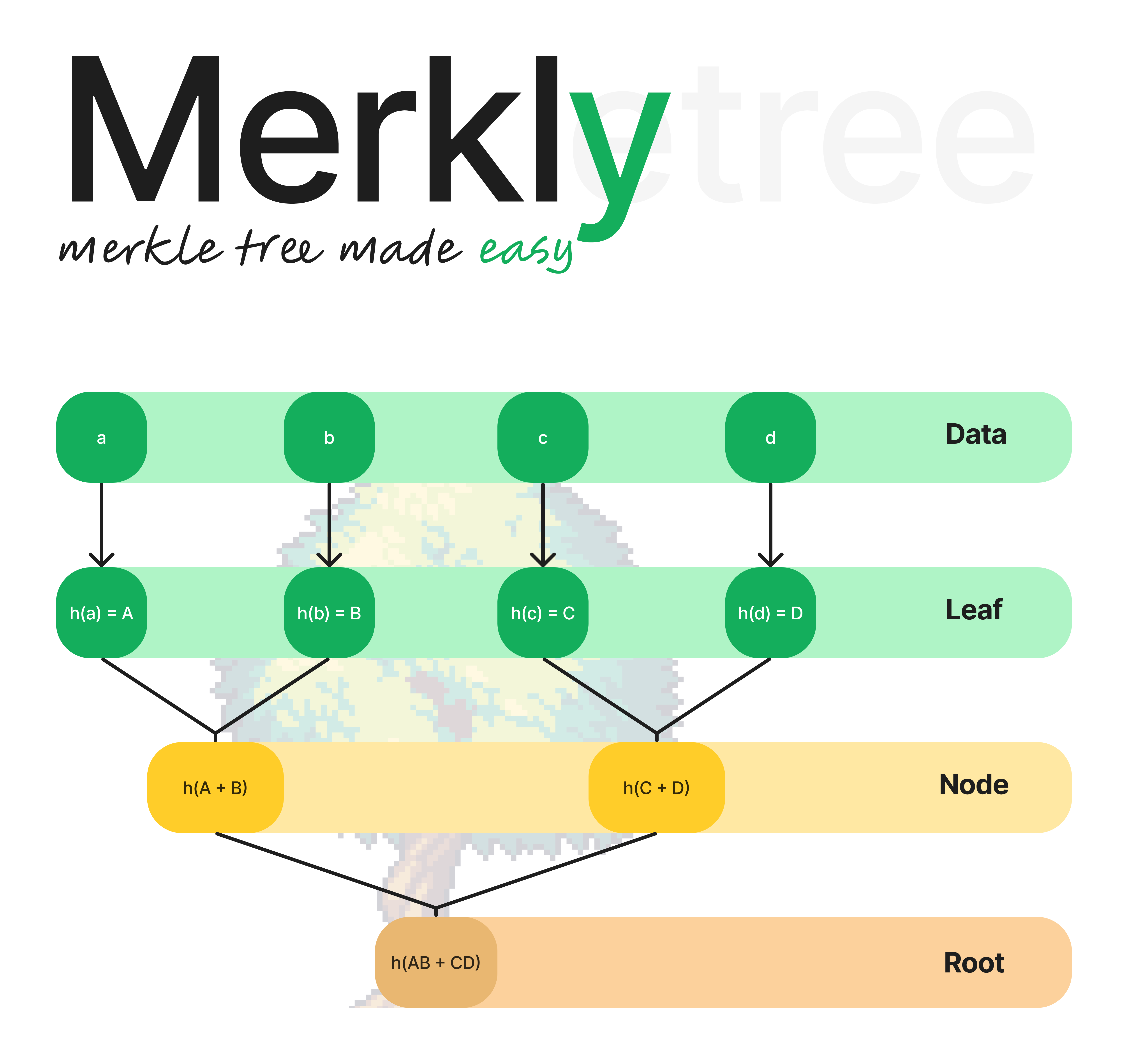The simple and easy implementation of Python Merkle Tree.
HOW TO INSTALL
poetry add merkly
pip install merkly
HOW TO WORKS
WARNING: We use keccak-256 under-the-hood if you dont pass your hash function
This library provides a clean and easy to use implementation of the Merkle Tree with the following features:
- Create Leaf
- Create Root
- Create Proof
- Verify Proof
HOW TO USE
Creating a Merkle Tree
from merkly.mtree import MerkleTree
from typing import Callable
# choose any hash function that is of type (bytes, bytes) -> bytes
my_hash_function: Callable[[bytes, bytes], bytes] = lambda x, y: x + y
# create a Merkle Tree
mtree = MerkleTree(['a', 'b', 'c', 'd'], my_hash_function)
# show original input
assert mtree.raw_leaves == ['a', 'b', 'c', 'd']
# hashed leaves
assert mtree.leaves == [b'a', b'b', b'c', b'd']
# shorted hashed leaves
assert mtree.short_leaves == [b'a', b'b', b'c', b'd']Creating a Default Merkle Tree (with Keccak256)
from merkly.mtree import MerkleTree
# create a Merkle Tree with keccak256
mtree = MerkleTree(['a', 'b', 'c', 'd'])
# show original input
assert mtree.raw_leaves == ['a', 'b', 'c', 'd']
# hashed leaves (just bytes)
assert mtree.leaves == [
b':\xc2%\x16\x8d\xf5B\x12\xa2\\\x1c\x01\xfd5\xbe\xbf\xea@\x8f\xda\xc2\xe3\x1d\xddo\x80\xa4\xbb\xf9\xa5\xf1\xcb', b'\xb5U=\xe3\x15\xe0\xed\xf5\x04\xd9\x15\n\xf8-\xaf\xa5\xc4f\x7f\xa6\x18\xed\no\x19\xc6\x9bA\x16lU\x10', b'\x0bB\xb69<\x1fS\x06\x0f\xe3\xdd\xbf\xcdz\xad\xcc\xa8\x94FZZC\x8fi\xc8}y\x0b"\x99\xb9\xb2', b'\xf1\x91\x8e\x85b#n\xb1z\xdc\x85\x023/L\x9c\x82\xbc\x14\xe1\x9b\xfc\n\xa1\n\xb6t\xffu\xb3\xd2\xf3'
]
# shorted hashed leaves
assert mtree.short_leaves == [b':\xc2', b'\xb5U', b'\x0bB', b'\xf1\x91']
# human leaves
assert mtree.human_leaves == [
"3ac225168df54212a25c1c01fd35bebfea408fdac2e31ddd6f80a4bbf9a5f1cb",
"b5553de315e0edf504d9150af82dafa5c4667fa618ed0a6f19c69b41166c5510",
"0b42b6393c1f53060fe3ddbfcd7aadcca894465a5a438f69c87d790b2299b9b2",
"f1918e8562236eb17adc8502332f4c9c82bc14e19bfc0aa10ab674ff75b3d2f3",
]
# shorted human hashed leaves
assert mtree.human_short_leaves == ["3ac2", "b555", "0b42", "f191"]Creating a Root
from merkly.mtree import MerkleTree
# create a Merkle Tree
mtree = MerkleTree(['a', 'b', 'c', 'd'])
# get root of tree (This is compatible with MerkleTreeJS)
assert mtree.root.hex() == '68203f90e9d07dc5859259d7536e87a6ba9d345f2552b5b9de2999ddce9ce1bf'Creating Proof of a leaf
from merkly.mtree import MerkleTree
from merkly.node import Node, Side
# create a Merkle Tree
mtree = MerkleTree(['a', 'b', 'c', 'd'])
# get proof of a `raw` leaf
assert mtree.proof('b') == [
Node(
data=b"3ac225168df54212a25c1c01fd35bebfea408fdac2e31ddd6f80a4bbf9a5f1cb",
side=Side.LEFT
),
Node(
data=b"d253a52d4cb00de2895e85f2529e2976e6aaaa5c18106b68ab66813e14415669",
side=Side.RIGHT
)
]Checking the proof of a sheet
from merkly.mtree import MerkleTree
from merkly.node import Node, Side
# create a Merkle Tree
mtree = MerkleTree(['a', 'b', 'c', 'd'])
# get proof of a raw leaf
p = [
Node(
data=b"3ac225168df54212a25c1c01fd35bebfea408fdac2e31ddd6f80a4bbf9a5f1cb",
side=Side.LEFT
),
Node(
data=b"d253a52d4cb00de2895e85f2529e2976e6aaaa5c18106b68ab66813e14415669",
side=Side.RIGHT
)
]
# verify your proof of raw leaf
assert mtree.verify(p, 'b') == True| Feature | Status | Version |
|---|---|---|
| Auto deploy PyPi | ✅ Deployed | 0.2.0 |
| Create Root | ✅ Deployed | 0.4.0 |
| Create Proof | ✅ Deployed | 0.5.0 |
| Verify Proof | ✅ Deployed | 0.6.0 |
| Use any Hash function | ✅ Deployed | 0.7.0 |
| Leafs of any size | ✅ Deployed | 0.8.0 |
| Security deprecation pysha3 | ✅ Deployed | 0.8.1 |
| Compatible with MerkleTreeJs | ✅ Deployed | 1.0.0 |
| First Issue solved by community | ✅ Deployed | 1.0.0 |
| Human readable leaves | ✅ Deployed | 1.1.0 |
| Accelerator code with Rust | 🏗️ Alpha | 1.2.0 |
| Tutorial how to use with solidity | 🖊️ Design | x.x.x |
| Tutorial how to use with MerkleTreeJS | 🖊️ Design | x.x.x |
- Before read a code of conduct: CODE_OF_CONDUCT
- Follow the guide of development: CONTRIBUTING





